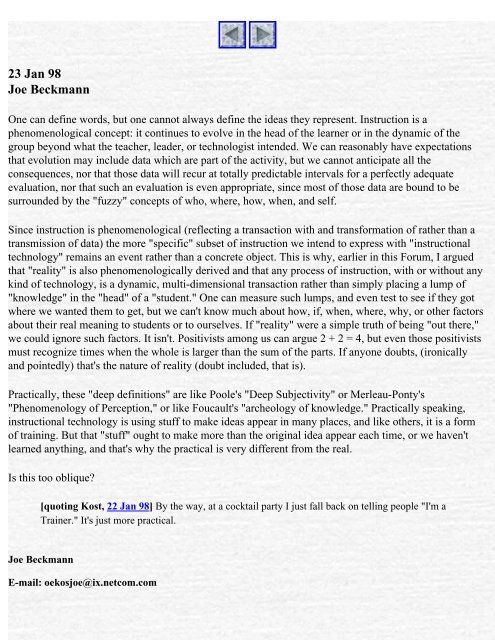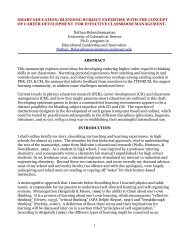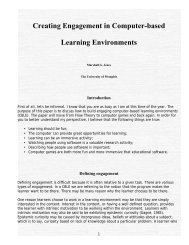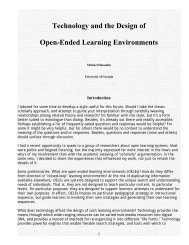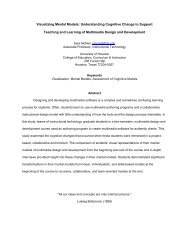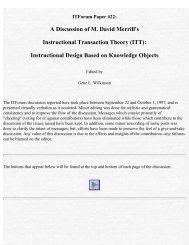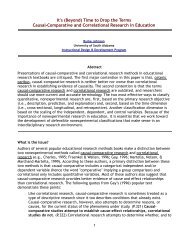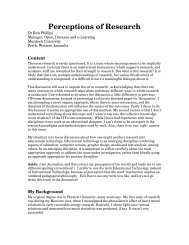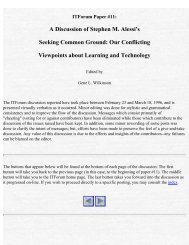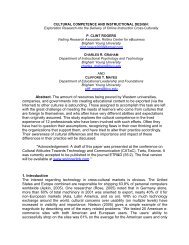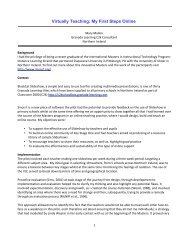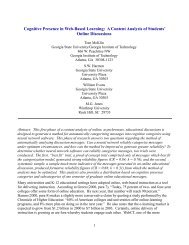21 Jan 98 Ernie Franklin - Instructional Technology Forum ...
21 Jan 98 Ernie Franklin - Instructional Technology Forum ...
21 Jan 98 Ernie Franklin - Instructional Technology Forum ...
You also want an ePaper? Increase the reach of your titles
YUMPU automatically turns print PDFs into web optimized ePapers that Google loves.
23 <strong>Jan</strong> <strong>98</strong><br />
Joe Beckmann<br />
One can define words, but one cannot always define the ideas they represent. Instruction is a<br />
phenomenological concept: it continues to evolve in the head of the learner or in the dynamic of the<br />
group beyond what the teacher, leader, or technologist intended. We can reasonably have expectations<br />
that evolution may include data which are part of the activity, but we cannot anticipate all the<br />
consequences, nor that those data will recur at totally predictable intervals for a perfectly adequate<br />
evaluation, nor that such an evaluation is even appropriate, since most of those data are bound to be<br />
surrounded by the "fuzzy" concepts of who, where, how, when, and self.<br />
Since instruction is phenomenological (reflecting a transaction with and transformation of rather than a<br />
transmission of data) the more "specific" subset of instruction we intend to express with "instructional<br />
technology" remains an event rather than a concrete object. This is why, earlier in this <strong>Forum</strong>, I argued<br />
that "reality" is also phenomenologically derived and that any process of instruction, with or without any<br />
kind of technology, is a dynamic, multi-dimensional transaction rather than simply placing a lump of<br />
"knowledge" in the "head" of a "student." One can measure such lumps, and even test to see if they got<br />
where we wanted them to get, but we can't know much about how, if, when, where, why, or other factors<br />
about their real meaning to students or to ourselves. If "reality" were a simple truth of being "out there,"<br />
we could ignore such factors. It isn't. Positivists among us can argue 2 + 2 = 4, but even those positivists<br />
must recognize times when the whole is larger than the sum of the parts. If anyone doubts, (ironically<br />
and pointedly) that's the nature of reality (doubt included, that is).<br />
Practically, these "deep definitions" are like Poole's "Deep Subjectivity" or Merleau-Ponty's<br />
"Phenomenology of Perception," or like Foucault's "archeology of knowledge." Practically speaking,<br />
instructional technology is using stuff to make ideas appear in many places, and like others, it is a form<br />
of training. But that "stuff" ought to make more than the original idea appear each time, or we haven't<br />
learned anything, and that's why the practical is very different from the real.<br />
Is this too oblique?<br />
[quoting Kost, 22 <strong>Jan</strong> <strong>98</strong>] By the way, at a cocktail party I just fall back on telling people "I'm a<br />
Trainer." It's just more practical.<br />
Joe Beckmann<br />
E-mail: oekosjoe@ix.netcom.com


